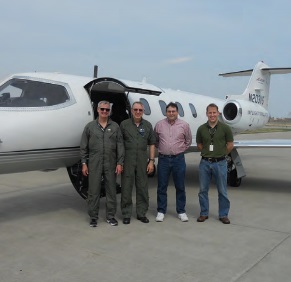Chapter: Engineering Successes, new invention technology, Research project papers,
SAFE-Cue to the Rescue!

SAFE-Cue to the Rescue!
Smart Adaptive Flight
Effective Cue (SAFE-Cue) is a novel adaptive flight control system that
provides a means to safely operate an air vehicle in the presence of damage or
system failures. The system alerts the pilot that the adaptive control system
is active, provides guidance via force feedback cues, and attenuates commands
to ensure pilot-vehicle system stability and performance in hazardous
situations. SAFE-Cue integrates
diverse disciplines
including adaptive compensator design, cockpit inceptor design, human operator
modeling, and aircraft handling qualities. The concept is completely
generalized and can be applied to any flight control system implementation as a
means to mitigate aircraft loss of control.
The technology was
developed under a NASA Small Business Innovation Research (SBIR) contract.
Work to date: In 2013, Armstrong
test pilots evaluated the SAFE-Cue technology on a Calspan variable
stability Learjet. The pilots evaluated system effectiveness in the presence of
pitch and roll axis failures and indicated the system successfully eliminated
oscillation tendencies that can lead to control loss. The technology was also
evaluated on the Vertical Motion Simulator at NASA's Ames Research Center.
Looking ahead: Because the results of both evaluations are
promising, the Armstrong team will continue to develop and evaluate
the technology. Use of SAFE-Cue is being considered to make both UAV and
lifting-body spacecraft such as the Dream Chaser operations safer by
implementing loss of control and pilot-induced oscillation safeguards as well
as assisting in vehicle energy management.
Partners: Systems Technology,
Inc., under an SBIR contract, and subcontractors Barron and
Associates and Calspan Corporation
'SAFE-Cue provides feedback to a pilot via an active control
inceptor. The system alerts the pilot that the adaptive
control system is active
and guides the pilot via force feedback
cues. '
Bruce Cogan, PI
Engineering Successes
Armstrong's Research and Engineering Directorate is responsible
for the overall engineering content of flight research projects. Our engineers
provide technical expertise in aerodynamics; guidance, navigation, and control;
propulsion; static and dynamic structures; flight hardware and software; flight
and ground test instrumentation and data systems; and system engineering and
integration. They apply their expertise across the spectrum of Armstrong's many
activities and also support the development and continual evolution of
engineering tools and test techniques. Here are highlights from a few recent
and particularly notable engineering success stories.
Related Topics